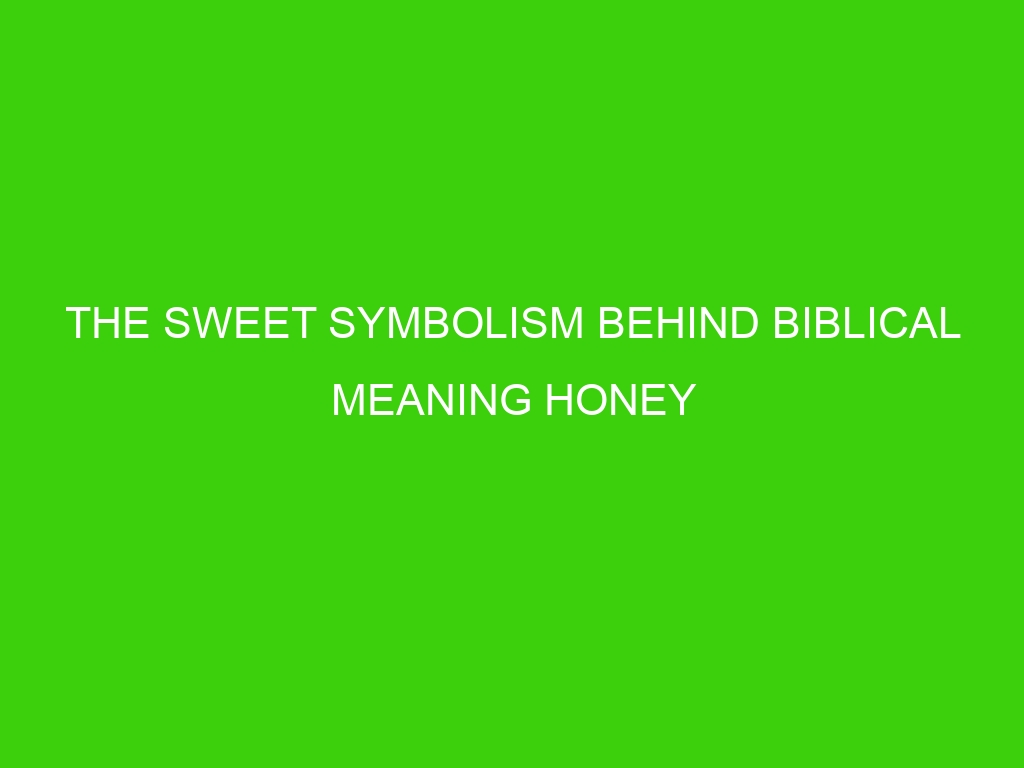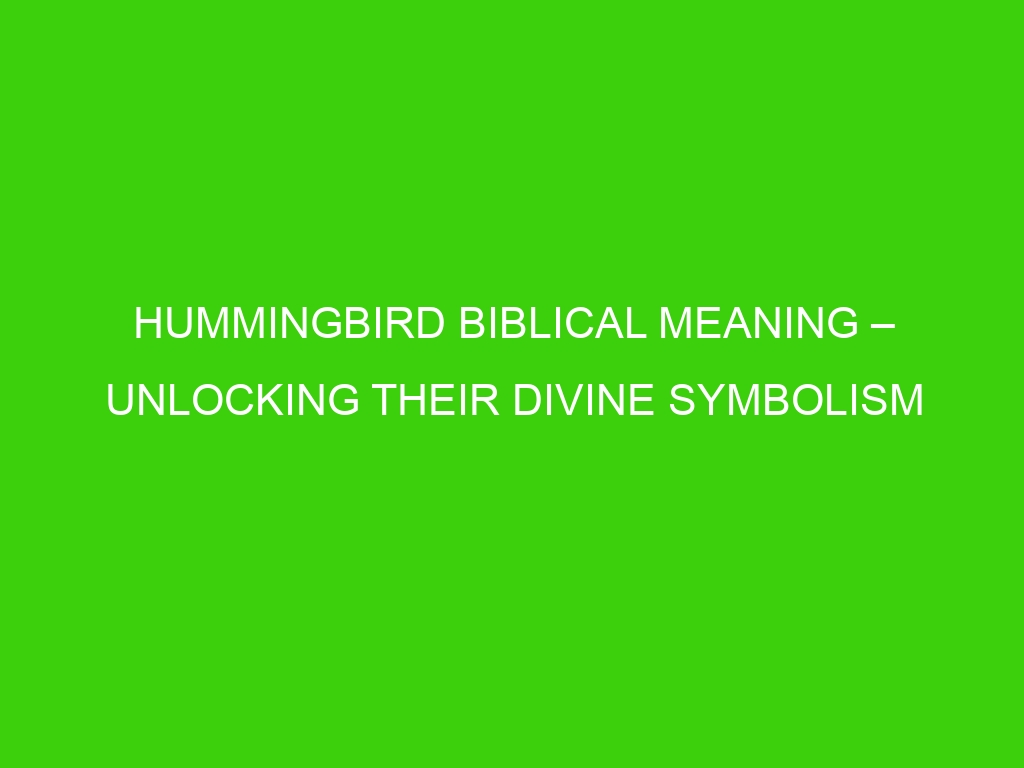You’re probably familiar with honey as a sweet treat or natural remedy.
But did you know that honey has deep symbolic meaning in the Bible? In fact, the Bible refers to honey over 60 times as a sign of God’s blessing, wisdom, and salvation.
As you dive into this article, you’ll discover how honey represents the promised land, God’s word, and the hope of resurrection.
You’ll learn why John the Baptist survived on wild honey in the desert.
And you’ll find out how honey even foreshadowed Jesus in scripture.
The rich imagery of honey in the Bible has a lot to teach us.
So grab a cup of tea, spread some honey on toast, and let’s explore the fascinating symbolism and significance of biblical meaning honey.
Honey in the Bible: A Brief Overview
Honey is mentioned over 60 times in the Bible, used as a symbol of abundance, nourishment, and blessing.
In the Old Testament, the Promised Land is described as a “land flowing with milk and honey” (Exodus 3:8).
When the Israelites finally enter Canaan, the spies report back that the land is indeed rich with milk and honey (Numbers 13:27).
Honey was a valued food source in biblical times.
Bees were not domesticated, so honey was gathered from wild hives in trees, caves, and crevices.
The honey mentioned in the Bible was dark amber, unfiltered honeycomb.
When Jonathan eats honey in 1 Samuel 14:27, he has to use his hands to wipe the honey from the honeycomb.
Honey was used as a sweetener, but it was also thought of as a treat or delicacy.
When Jacob sends a gift to Egypt, he includes honey, spices, and nuts (Genesis 43:11).
Similarly, when King Solomon describes the beloved in the Song of Songs, he compares her lips to honeycomb, and her mouth to honey (Song of Songs 4:11).
Beyond its practical uses, honey also took on symbolic meaning in the Bible.
God promises that He will guide the Israelites to a land flowing with “milk and honey” – a land of abundance and nourishment.
Honey comes to represent blessing, nourishment, abundance, and sweetness.
Similarly, the wisdom of God’s word is compared to honey in Psalms 119:103.
##Overall, honey was a treasured food source, a symbol of blessing and abundance, and a metaphor for God’s wisdom and goodness.
Honey as a Symbol of Abundance and Sweetness
Honey is one of the most referenced foods in the Bible, appearing over 60 times.
References to honey, a sweet treat, often symbolize abundance, sweetness, and nourishment.
A Sign of Prosperity
In the Old Testament, the land of Canaan was described as “a land flowing with milk and honey” (Exodus 3:8).
This metaphor portrayed Canaan as a fertile, prosperous land.
Similarly, Jonathan’s eyes “brightened” when he ate honey, illustrating how honey brought delight (1 Samuel 14:27).
For a substance as sweet as honey to be plentiful was a sign of abundance and blessing.
A Sweet Blessing
Honey also signifies sweetness, pleasure, and nourishment in the Bible.
When Samson discovered bees and honey in the carcass of a lion, for example, he shared it with his parents, saying “Out of the eater came something to eat, and out of the strong came something sweet” (Judges 14:14).
The sweet honey was an unexpected blessing and gift.
Spiritual Nourishment
The Bible also uses honey as a metaphor for spiritual nourishment and wisdom.
King Solomon writes “My son, eat honey because it is good…so shall knowledge of wisdom be to your soul” (Proverbs 24:13-14).
Just as honey nourishes the body, wisdom nourishes the soul.
The words of God and the Bible are described as “sweeter than honey” (Psalm 119:103).
Honey continues to be a powerful symbol today.
Whether a sign of abundance, sweetness, or spiritual nourishment, honey represents some of life’s greatest blessings and pleasures.
What a fitting image for the Bible to use! The next time you spread honey on your morning toast, think of the rich biblical symbolism behind this golden treat.
Honey Representing Wisdom and Knowledge
In the Bible, honey is used as a metaphor for wisdom, knowledge, and spiritual nourishment.
As sweet as honey tastes, God’s word and truth are even sweeter.
The Bible says “How sweet are your words to my taste, sweeter than honey to my mouth!” (Psalm 119:103).
God’s wisdom and knowledge are like honey – sweet, rich, and satisfying.
By reading and meditating on Scripture, we can feed on this spiritual honey.
We gain wisdom and insight into God’s will and ways.
This wisdom from above is “first pure, then peaceable, gentle, willing to yield, full of mercy and good fruits, without partiality and without hypocrisy” (James 3:17).
When we read the Bible, we should do so with the eagerness and delight of tasting honey.
The words of Scripture are meant to be savored, not just skimmed.
As we read and reflect on God’s Word, His wisdom and truth will become sweeter to us than honey.
We will grow in knowledge and understanding of God.
In the Old Testament, Israel was described as a land “flowing with milk and honey” (Exodus 3:8).
This promised land of abundance represents how God wants to lavish us with spiritual nourishment and sweetness.
But we must pursue this wisdom and knowledge from God’s Word.
It won’t simply drop into our laps like manna from heaven.
God invites us to “come, eat of my bread and drink of the wine I have mixed.
Forsake foolishness and live, and go in the way of understanding” (Proverbs 9:5-6).
By feasting on Scripture, we can leave behind foolishness and walk in the way of wisdom and knowledge.
The Bible is a perpetual fountain of insight and truth – an endless supply of soul-sustaining honey.
So open your Bible, the honeycomb of God’s Word, and enjoy its sweetness.
Feed on its wisdom and grow in understanding.
As you do, you’ll find that God’s truth tastes sweeter than honey.
Nothing else can satisfy like the richness of His wisdom.
The Promised Land Flowing With Milk and Honey
The Bible often refers to the Promised Land as a “land flowing with milk and honey.” This poetic description conjures up images of abundance and fertility.
For the Israelites wandering in the desert, the promise of a fertile land must have sounded like a little slice of paradise.
A Land of Abundance
The phrase “milk and honey” represents a place overflowing with life’s essentials and sweet treats.
Milk, of course, provides nourishment and sustenance.
Honey signifies sweetness, pleasure, and natural abundance.
Together, they paint a picture of a lush, fertile land that provides all that is needed to live comfortably.
A Gift From God
The Promised Land was a gift from God to the Israelites after their long captivity in Egypt.
God promised to give them “a land flowing with milk and honey” if they followed His commandments.
When the 12 spies returned from Canaan, they reported that the land was as fertile as promised, “flowing with milk and honey” – it was a land of abundance, all that God had promised them.
A Land Set Apart
The phrase “milk and honey” also signifies the Promised Land as a place set apart.
While the desert was a harsh, unforgiving environment, the Promised Land would be a place of rest, nourishment, and sweetness.
It was a holy land, consecrated by God for His chosen people.
Their possession of it was a sign of God’s blessing and faithfulness to His promises.
The Promised Land of “milk and honey” represented hope, abundance, rest, and God’s provision for the Israelites.
Although they had to fight to possess it, the rewards of that fertile land would be sweet.
Its description has endured as a poetic symbol of paradise found and God’s lavish blessings.
Honey Used in Religious Practices and Offerings
Honey has long been an important part of religious rituals and offerings.
As far back as Ancient Egypt, honey was used as a sacrificial offering to the gods.
The Egyptians believed that the sweetness of honey would appease the gods.
Honey was also used in mummification and purification rituals.
In many religions, including Christianity, Judaism, and Islam, honey is a symbol of spiritual sweetness and God’s favor.
The Promised Land is described as “a land flowing with milk and honey” in Exodus.
Honey is also used as a metaphor for God’s word in Psalm 19: “The judgments of the Lord are sweeter than honey.”
Offerings and Sacrifices
In the Old Testament, honey was used as an offering and sacrifice to God.
The first fruits of the harvest, including honey, were offered to God.
Honey, along with oil and grain, was used as a “meal offering” to God.
The sweet aroma was thought to be pleasing to God.
Honey was also used as a drink offering, poured out as a sacrificial libation.
Purification and Healing
Honey played an important role in ritual purification and healing.
Newborn babies were rubbed with honey, and honey was used as a balm for skin irritations and wounds.
Honey’s antiseptic properties made it useful for embalming and mummification in Ancient Egypt.
Some believe the Promised Land “flowing with milk and honey” also symbolized a land of healing.
Sweetness and Favor
The sweetness of honey has long been a metaphor for God’s favor and blessing.
In the Bible, honey represents the sweetness of God’s word, God’s promises, and God’s favor.
The sweetness of honey is likened to the sweet fellowship with God.
When Jonathan’s eyes were opened after eating honey, it represented his spiritual illumination.
Honey is a symbol of enlightenment, wisdom, and knowledge of the divine.
Honey has been an integral part of religious rituals, offerings, and symbolism for millennia.
Its sweetness represents God’s blessing, favor, and word.
Honey brings purification, healing, and enlightenment, nourishing both the body and the spirit.
No wonder the Promised Land is described as a “land flowing with milk and honey.”



